KONCEPT OF THE RETROSPECTIVE RECOLLECTION
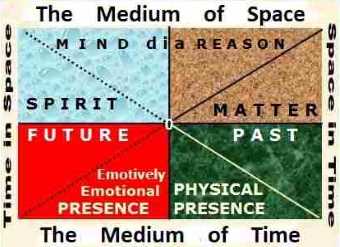
Abstract Methodological Creative Framework: Four Key Concepts of the Dialectical Understanding of Time and Space, expressed through its Two Paired Dialects: Time in Space ⇄ Space in Time DIA Medium of Time ⇄ Medium of Space
ABSTRACT METHODOLOGICAL FRAMEWORK FOR CREATIVE CONSIDERATION OF THE CONCEPT OF RETROSPECTIVE RECOLLECTION: This creative article explores the concept of retrospective recollection and reminding, accordingly the revival of traces of deeply experienced emotively emotional impressions left behind, which as such were imprinted in time DIA space [spirit, mind dia reason, matter].
- To give you an initial idea of the concept of retrospective recollection, retrospective memory is remembering something thou already knew or learned in the past that is still present in thy current memory (consciousness and awareness). But imagine a scenario in time DIA corresponding situation in space, that thou have forgotten a word of a foreign language, or thou cannot remember it at that moment, even though it is on the tip of thy tongue. No matter how much mental effort and energy (matter) thou invest to find it by searching thy current memory, thou will feel that in this way thou are only pushing it further into the subconscious, that is, thou still cannot remember it, because thou are looking for it and retrievaling in the wrong place (current memory of awareness). Only in rare cases, if that word has not yet sunk deeper into the subconscious, it can be pushed up and returned in this way to the current memory of consciousness (recollected = collected again), that is, to a collection of (more often) used words and concepts.
- In other words, instead of using this mostly fruitless approach and method to remember something that thou (momentarily) forgot, it is necessary to use or find some way to pick it up again and return it again to the collection of (more often) used words and concepts, that is, to recall it again from the subconscious to the conscious [for example using a dictionary, because thou know how that word is said in another language thou know], thou ask someone else to remind thee of that word, or for thou to remember in some other way by reawakening that forgotten word. It follows from this that it is about finding some way to bring that word from the jurisdictional boundaries of mind (subconsciousness) controlled by the spirit, that is, by thy spiritual abilities and capabilities [emotional potential of thy mind] back into the framework of the limits of reason (awareness) in order to be able to apply thy mental (reasonable) abilities and capabilities with the inevitable consumption of the appropriate type of material energy. This is easy to notice since in moments of inner tranquility when thou do not invest any mental effort and energy to remember this forgotten word, this word "by itself" [with the help of the spirit, i.e. the inner spiritual tranquility of thy mind] floats out of the subconscious into the consciousness of thy current memory.
- I hope that thou have now understood the essence of the concept of retrospective recall, reminder, and recollection, which is that thou cannot simply remember something thou have forgotten and that something that does not exist in the current memory does not make sense to search there, but that thou (momentarily) forgot, thou can only pick up (collect) again and return to the collection of (more often) used words and concepts of the current memory, that is, call again (recall) in some way from the subconscious of the mind to the consciousness and awareness of the reason (recollection). Despite all this previously said and explained, the end result of the perverted use of the concept of logos, started with the well-intentioned approach of Descartes but still by applying the dual (AND - AND) → bipolar (OR reason OR mind) dia binary utmost result of this OR - OR approach and method [the complete supremacy of the reason and the corresponding intellectual capacities over the mind and the corresponding spiritual faculties], which encouraged the numerous adherents of the vulgarized simple reason and mind to use words and concepts as they pleased. In addition, with the arbitrary translation from one language to another, in almost all modern languages, this resulted in the replacement of reason with the mind, that is, the deviant and corrupted use of the concept of logos (ratio in Latin).
- For example, although the English language has a proper word for the concept of "picking something up again (re-collecting something) from somewhere", in the modern English language this concept is used more and more often as a synonym with the words to remember something (forgotten) or to remind oneself, accordingly, to recall something remembered or experienced in the past, despite the fact that there are already corresponding far more correct and precise words for these terms (to remember or to reminiscence). Anyway, I hope thou have got the initial gist of the concept of retrospective recollection. The next step is to skip this modern-initiated process of further and further decadence of the concept - logos [cultivation of the cult of the simple mind and reason, as well as various forms of manifestation of the simpleton], that is, to travel retrospectively 2500 years back to the time of the great Greek philosopher and thinker Plato.
- In other words, to return to one's roots, to the still recognizable concept and understanding of the conception - logos, reading his theory of recollection, that is, his concept of spiritual, mental, and rational (reasonable) recollection (of the immortal soul: Anamnesis). More will be said about it in the next chapter of this creative article. I hope thou sense that the concept of retrospective recollection is actually about recollecting and reviving the dormant deeply imprinted impressions of the thought patterns of time, in time DIA space [spirit, mind dia reason, matter], that is, about their transmission and recollection from time in space [hidden future in spirit: NOW and THERE] with the aid of the human senses of intuition and premonition, as well as of the sense of feeling (of inner self) into this five-sense space in time [matter embedded in the past: HERE and NOW] using the appropriate medium of space [mind dia reason] and time [emotive emotional presence in that time in space (NOW and THERE) dia thy physical presence in this space in time (HERE and NOW)].
In other words, the concept of retrospective recollection was used in this cluster of (four) creative articles, instead of the corresponding term that describes a (still-living or in other ways recorded) remembering the events of the past (reminiscence) because the focus of this manifestation of mental - emotively emotional intellect (retrospective recollection in this particular case) is put on the COLLECTING and reviving the extremely faded traces of some forgotten remembering, which is memorized and preserved inside time in space (a concealed future embedded in spirit) after the ultimate separation from its physical (bodily) space in time. To cut this long story short, only after the future physical reunion with the appropriate space in time (matter embedded in the past),
- which allows the possibility of reconnecting in the spiritual sense to an "imaginative server" (of God) using thy encoded key-words hidden somewhere within thee (inside thy kingdom) to access this re-collectible dialectical interactively creative content,
that is, with the re-establishment of this dialectical understanding of time and space, conditions are created for the realization of this manifestation of the potential future hidden in the spirit (invisible, hidden time in space) in terms of transmission, unzipping, and re-enlightening this extremly compressed collection of (spiritual) dialectuls. This initiated dia-process is followed by the deciphering, unriddling, figuring out, and revealing this vague, hidden creatively interactive content within the dialectical understanding of the medium of time (emotively emotional dia physical presence) and space (mind dia reason) (Luke 8.17 and Mark 4.22 –23).
Or expressed this in another way, retrospective recollection is about inititiating the dia-processes of collecting variously shaped dialectuls of its belonging collection which is deeply engraved in the inner time in space (NOW and THERE) in accordance with their shared values, common characteristics, as well as with their spiritually reasonable similarity, match, and resemblance (harmonizing their "colors", for example, in thy temporal dia spatial medium) while continuously unfolding and sorting, disassembling and reassembling an enigmatic ("jigsaw") puzzle of the dialectical understanding of time and space by embedding this dialectical creatively interactive content into some manifestation of the external space in time (HERE and NOW). This abstract idea can be further generalized and elaborated, and then applied for the purpose of retrospective recollecting and reviving some forgotten or lost knowledge, deciphering hidden meaning of a dialectos, unriddling and figuring out the full meaning of a parable and the like. Apart from that, it can be spotted, detected, and disclosured a misinterpreted, fabricated or (later) added content to Holly Books and Scriptures (by earthly 'prophets and scribers'), which are incompatible, inconsistent, and in discordance with the original statements, as well as that can be veryfied by undertaking the appropriate creative traveling through this dialectical understanding of time and space (spirit, mind dia reason, matter).
general methodical creative framework of the concept of retrospective recollection
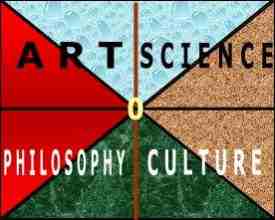
The Background Simulation Settings of the Dialectic Interactive Approach
DIA
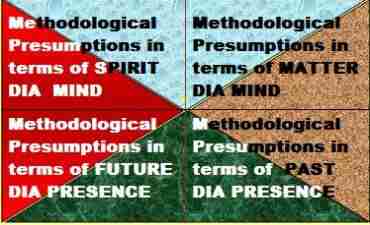
The Ultimate DIA Probable Methodological Presumptions of the Dialectic Interactive Approach
In order to methodologically explain such a complex topic, such as retrospective recollection, understood in terms of retrospective resuscitation (revival) of these embedded (dormant) thought patterns, that is, their transmission and translation in the medium - mind dia reason, the linguistic dialects of the "Background Simulative Methodological Assumptions of the Dialectical Interactive Approach" (culture, philosophy, art and science) were again used, understood in terms of putting this in an appropriate dialectical creative context by means of the "Ultimate DIA Probable Methodological Presumptions". In other words, these very complex dialectical content has to be reconsidered in time DIA space, from the perspective of their consistuent dialects DIA appropriate:
- Ultimate DIA Probable Methodological Presumptions, understood in terms of Spirit DIA Mind,
- Ultimate DIA Probable Methodological Presumptions, understood in terms of Matter DIA Mind,
- Ultimate DIA Probable Methodological Presumptions, understood in terms of Future DIA (emotively emotional) Presence,
- Ultimate DIA Probable Methodological Presumptions, understood in terms of Past DIA {emotively emotional [dia eventually, (relatively very recently) impressed and imprinted factual experiences (remembrances) by thy physical]} Presence.
It should be here paid attention to the use of notion - remembrance (memory), which unlike the previously explained interpretation of the term - recollection, encompasses the dialectical contents, which were factually experienced in the past, understood in terms of the physical presence of someone in time DIA space, somewhere here on the Earth (or solar system), and for this reason, their authenticity and validity (truthfulness) can be witnessed (and be verified), both by personal statements and by (recorded and filmed reports and) statements of other participants (witnesses) in these events of the relatively near past. On the other hand, hidden (dormant) dialectical contents, which once took place in some uncertain, subconscious or "unconscious" (unknown) time DIA space, but which were experienced with VERY DEEP EMOTIONS, either in person, or by thy distant (genetic and) SPIRITUAL ancestors [there are no living witnesses or behind left written testimonies and archeological findings], somewhere within the worlds of dialectics (universes), and as such they were impressed and imprinted into the vast expanses of the inner DIA the innermost being [some kind of the (outer) universe in small: Thy kingdom], can ONLY BE RETROSPECTIVELY RECOLLECTED, reminded, and revived in the medium - mind dia reason with the help of (spiritual) EMOTIVELY - EMOTIONAL PRESENCE dia thy physical presence.
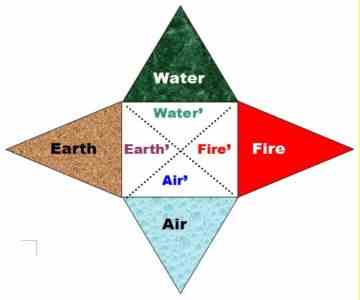
Life-Vital Four-Triangular Star, as a Creative Upshot of the Three Basic Dialectical Principles, Aspects, Properties and Manifestations in the Time DIA Space
These ideas were also suggested by Plato, during his creative efforts to explain and conjure up the process of learning and reviving an (unknown) knowledge with help of retrospective recall, or more precisely of retrospective recollection of what the soul already knows, because the soul is eternal and remembers everything it has already experienced. In doing so, he uses his theory of recollection and recalling by applying the concept of Anamnesis, that is, recalling some deeply engraved dormant knowledge in the soul of a person during a previous life. This innate knowledge that every human being carries within himself needs to be brought to light through learning and teaching with the help of an external guide. Keeping this in mind, according to Plato, who was cognizant of some secrets of the Egyptian hidden knowledge, and later teaching this brought knowledge in the school, which he established after his return to Athens, the efforts of a teacher should be directed and focused on the retrospective recollecting, reminding, and reviving this in deep sleep dialectical content instead of re-teaching and relearning it as something completely new and unknown, that is, redundantly impressing and imprinting it again in the memory of reason, accordingly re-experiencing dia impressing and imprinting it again in the memory of time DIA space.
- In contrast to Plato's interpretation of retrospective reminder of innate knowledge based on the concept of the universal soul, the dialectical understanding of retrospective recollection, reminding, and disclosure of hidden knowledge is based on the concept of inner dia the innermost being possessed by every living being (individual way of thinking and deliberation), which is a far broader and more complex concept, explained in more detail in other creative articles. Here, too, the concept of distinguishing true creative paths from many other creative paths in a labyrinth of many variants and choices in these endless inner worlds of dialectics plays also a decisive role. Whether thou will succeed or not, to correctly assemble all the parts of this enigmatic jigsaw puzzle of creating or reviving knowledge by retrospectively remembering as well as being reminded from time to time, depends on the degree of purity of thy inner self.
- In short, another important difference from Plato's concept of retrospective recollection is the introduction of the notion of an inner hidden guide that plays a key role in this way of creating and disclosing knowledge. In other words, only with his or their help, the initiated dia-processes can be successfully solved, that is, come up with an appropriate piece of this puzzle of creating knowledge out of this kind of creative loops: assemble, and disassemble until all its pieces are put together correctly. This is a painstaking and time-consuming process of reviving hidden knowledge, and it is, therefore, difficult to imagine that such a patient guide and teachers could be found in this external low-and spiritually underdeveloped world. About these aspects of the Spiritual DIA Mindual Intelligence will be more words in other parts of this creative article.
- [in subconscience, understood in terms of this manifestation of the universe in small, or in inconscience, if you so will]
- When someone managed to concentrate (gather together) and strengthen spirit in such an extent and power ... then (s)he in such a state directs the spirit to the heavenly realm of sense-hearing. There, with this heavenly sense of hearing clear sounds hears, that surpasses the common people’s abilities, both kinds of tones, the heavenly and earthly, the far sounds and the near ones. ... ....
- .... When someone managed to concentrate and empower spirit in such an extent ... ... then (s)he in such a state directs the spirit to the knowledge of (retrospective) RECOLLECTION of former states of mind, soul, former-lives ...
- .... How can you say, 'SHOW US the Father’? Don’t believe that I am in Father, and that the Father is in Me. The words I say to you are not just My own. Rather, it is the Father, LIVING IN ME, who is doing His work" (John-14:9-10).
- Plato excellently figuratively touched on this problem of the soul (inner being) using the myth of winged chariots with harnessed black and white horses driven by a celestial driver (innermost being). The white horse is of a noble breed, obedient, strong, and good-natured, while the black horse is disobedient and bad-tempered. For this reason, it is difficult for this celestial driver to control this black horse by curbing his bad habits and innate disobedience, that is, to have control over him all the time. The wings in this mythological dialectos serve to elevate this type of fighting chariot towards the kingdom of the gods, that is, the kingdom of ideas and knowledge. But every time this celestial driver loses control of the black horse (darkened areas of the soul), the chariot loses its wings and falls from these heavenly heights into this earthly imperfect world, where they enter the body in the form of a soul, as a kind of prison for the soul.
- In order for this fallen soul to rise again and return to the perfect world of ideas, its constant growth in knowledge and development in understanding is necessary, until the maximum level of knowledge is reached. If this precondition is not fulfilled, the soul will continue to inhabit the various bodies of this earthly imperfect world. In this Plato's concept of retrospective recollection, human beings with adequate guidance are able to gradually reveal this hidden knowledge, which was buried in the memory and remembrance of the soul (Anamnesis) during its stay in the world of the gods. According to Plato, earthly objects [captured space in time] are only copies of the world of ideas [time in space, in the dialectical understanding of time and space].
- Even in everyday conversation with these five-sense beings, it is noticeable that while they are looking for appropriate words, they scan the available vocabulary with a rectilinear left⇄right movement of their time hand, acting similarly to a compass. At the same time, this explains why deeply vulgarized simple minds often lose touch with events in this outside world, sinking into the vast depths of this abandoned empty hole, like a drunken or drugged person, who gradually loses all connection with reality.
In agreement with this approach to the retrospective reminder, recollection and disclosure of some form of hidden knowledge, since this dialectical (interactively creative) content (in a state of deep sleep) had already been experienced [and DEEPLY impressed and imprinted into the inner dia innermost being: "thy kingdom is within thee"] by student (disciple), the traces of this dialectical content left behind in time DIA space
potentially can be awaken, set in motion and then evoked, conveyed and translated (unzipped, decrypted and figured out) in the mind dia reason.
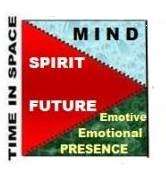
Dialectically Synthesised Inner Being DIA the Inmost One: Soul in Plato's Concept of the Retrospective Recollection
These hidden (dormant) dialectical contents of the spiritually impressed DIA deeply imprinted TIME IN SPACE (future in spirit) can be recognized with careful observation of the graphic illustration of the "Dialectical Creative Framework for Orientation in the Eternity of Times DIA Infinity of Spaces", and then from this dialectical perspective, the dialectical happenings after death can be conjured up. Seen from the point of view of this dialectical creative framework, DEATH was graphically illustrated and presented with a scenario in time DIA the corresponding situation in space, when the cross (+) is no longer able, for one reason or another, to prevent the blurring of the invisible boundaries of space and time, due to which time and space fuse, which leads to the separation of not only dialects - time in space (NOW and THERE) from space in time (HERE and NOW), which are kept apart by a wide crosswise (x: wide diagonal cross), but there is also a merging and disappearance of the constituent dialects of time in space (future - spirit), and space in time (matter - past), that is, the boundaries between them disappear.
death dia afterlife
death dia life after death 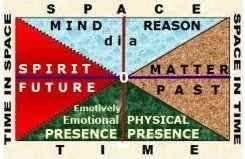
Dialectical Creative Framework for Orientation in the Eternity of Times DIA Infinity of Spaces 
DEATH dia AFTERLIFE seen from the Perspective of the Dialectical Creative Framework for Orientation in the Eternity of Times DIA Infinity of Spaces (Clinical DIA Biological Death → Life after Death according to the Dialectical Understanding of Time in Space)
This described scenario in time DIA the appropriate situation in space is known as the state of the clinical death of a living being. There are a lot of (scientifically) verified cases, that the cross dia broad crosswise managed to reestablish and recover all or almost all constituent parts (dialects) of this dialectical understanding of time and space, which is based on the hidden pre-ancient knowledge. By the way said, the unconscious state of a living being and coma were illustrated by depicting the overlapped cross and crosswise (x ⇢ +) and the overlapped crosswise by the cross (+ ⇢ x). But after the biological death, time DIA space is irretrievably separated into spiritual (emotive emotional) dialect and physical (material) dialect, understood in terms of ("jurisdictional boundaries and competencies of") dialects - time in space and space in time. In this way, both medium of time and medium of space are also separated into spiritual and earthly dialect, and for this reason, the common medium no longer exists within which happenings can be recorded and remembered or events can be taken place, because time and space merged, that is, the invisible boundaries between them disappeared. Or expressed in another way, which is in complete agreement with the hidden knowledge, the wide diagonal cross confirmed the earthly biological death after the still missing authorization (NOW and THERE) arrived through its two arms, that is, the power of attorney is given to the cross (HERE and NOW ) to implement the final separation of time in space [future in spirit] from space in time [embedded matter in the past: dead body], which is in accordance with the dialectical understanding of the Trinity of Crosses in time and space DIA their unity and oneness in the eternity of times dia the infinity of spaces.
From this it follows that death occurs as a result of the permanent dysfunction of time medium (temporal medium) dia medium of space, that is, there is no longer any mutual interaction between their mind-reasonable and physical-emotional dialects. Either way, seen from the perspective of this concept of retrospective recollection, everything else, which was physically memorised (dialect - matter) in terms of dialect - reason within the dialect - SPACE IN TIME (matter embedded in the past: dead body) left behind, will only be EXTERNALLY remembered and memorised by her, his family, relatives, friends, followers, autobiographians, historians, understood in terms of "in memory of ....". For this reason, from now on, as well as in the next three creative articles dedicated to the concept of retrospective recollection, remembering, and reminding, the focus of creative efforts will be put on the dialect - time in space (the future hidden in the spirit: NOW and THERE), because within of this inner universe in small, appropriate creative journeys are undertaken through this dialectical understanding of time and space (spirit, mind dia reason, matter).
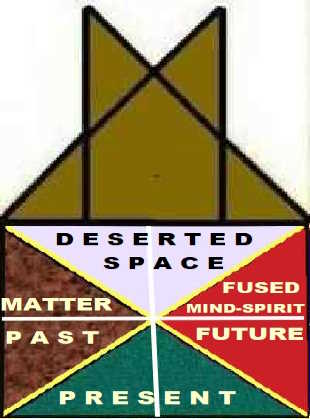
Methodological Reasoning DIA Comprehending of the (Recti)linear Space and Time, understood AS SOMETHING OUTSIDE US
There is no doubt that this creative content, related to the retrospective recollection and revival of once upon a time "experienced" i.e. dormant dialectical contents of time, in time DIA space (spirit, mind dia reason, matter) with the help of dialect - emotively emotional presence, as one (pre-ancient "retrospectively telepathic") approach to discovering the new and unknown in time DIA space, completely contradicts the "modern" scientific (methodological) approach, because there are no SCIENTIFICLY established points of orientation in this unspeakably vast span ("of eternity") of times DIA ("infinity of") spaces. Namely, according to them, in order for a creative result to be credible and worthy of the truth, it must be successfully repeated (falsifiable), that is, it must be verified with repeated experiments, confirmed with objectivist facts, "written testimonies", archaeological findings, and the like [that is, verified with the five (scientific) senses]. On the other hand, the expressed dialectical content through my impressions of the cognitions experienced, the experiences gained and the self-realizations (self-awareness) acquired during the undertaken creative journeys DIA the hidden creative action of this inner creator of knowledge (also, as one example of it, read John - 14:9-10), far exceeds the ability to observe (and perceive) it with the five basic senses.
By the way said, even animals possess these five well-developed senses (the instinct as well), thereby the capabilities of perception by their senses often surpass the corresponding senses of people and human beings. But in spite of it, their creative capabilities are very limited, and far below of the corresponding creative abilities of the SEVEN-SENSED HUMANS, and also below of abilities of these five-sensed beings as well. Either way, the purpose of this dialectical reconsideration, reexamination, and questioning of the role and expediency of this scientific five-sense credence, validation, and verification of previously expounded creative cognitions and acquired self-realizations and experiences, related to the concept of retrospective recollection and recalling, has little to do with the role, abilities, and capacities of five-sense observation and perception, and their sensory reaching during this way of creating or reviving new knowledge. Rather it could be said that it has far more in common with the abilities of the sixth sense (sense of presentiment and premonition: intuition), and especially, with the abilities of the seventh sense [emotively emotional sense DIA spiritual feeling of its inner self, or of thy (deep) human roots, if you will]. Keep in mind that only those who possess these two human (spiritual) senses (humans and human beings) are capable of being emotive-emotionally present in the NOW and THERE (time in space) and thus are able to recollect retrospectively, recall, and potentially revive these deeply imprinted and impressed imprints and traces, which are preserved within the memory of time DIA space.
Retrospective Recollection: Completition of Methodological Settings of the Dialectical Interactive Approach

The Background Simulative Methodological Assumptions of the Dialectic Interactive Approach
DIA

Dialectical Creative Framework for Orientation in the Eternity of Times DIA Infinity of Spaces
VERSUS
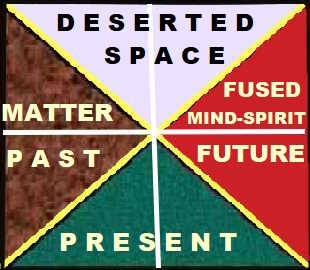
(Recti)linear Creative Framework for the Orientation in Time AND Space, as a Fused-Minded Fundament for Coming into Being a Simple-Minded Person
AND
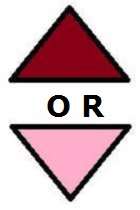
Ultimate Upshot of the Bipolar DIA Binary Way of Thinking within the Rectilinear Underatanding of Space and Time
Until now, this dialectical content was still considered by a relative strong emphasising the dialects - science, philosophy and art. By reconsidering this from the viewpoint of the pre-ancient approach towards discovery of unknown in time DIA space, this dialectical content under creative consideration should also be reconsidered from the (tri)angle of dialect - culture. Particularly by attentive reading Holy Books and Scriptures, this thematic can be recognised in an another approach to the "discovery of unknown". In the religions of the Far East, the creatively PHILOSOPHICAL aspects of spiritual abilities related to the retrospective recollection of buried knowledge (of times gone by) in the depth of the inner being were very thoroughly exposed and elaborated. As an example, in the teaching of Buddha - "Samannya Phala Sutta" this was utered in the folowing way:
On the other hand, in the Old and New Testament and Koran, this dialectical content was manifested, both in an indirect form of expression ["the vision, word of the Lord (God) come to me" ... (Isaiah - 1:1, Jeremiah - 1:4, Zechariah - 1:7) and in a more direct way (Moses - 19:3, Job-12:22). Also read the introductory words of the Koran. In short, all this can be summarised by the following sentence: "It is the Spirit in a human being, the breath of the Almighty, which gives her, him understanding" (Job-32:8). Christ expands this dialectical content further by presenting and interpreting the inner DIA INMOST being like a Living (alive) Being, who acts within Him, with the following words:
In short, by these dialectical content of Holy Books and Scriptures was conjured up by means of implementing dialects - philosophy and culture how can be cross-bridged and prevailed these (remote) shores and boundaries of unknown in time DIA space into known. Or with the words of this creator of knowledge, how can be prevailed the gap, that separates thee from the greatest creator of knowledge: God. A prerequisite for achieving this is a continual cleaning, cultivating (receiving and maintaining: Mark, 10:15 DIA David - 51:5 - 17), and the spiritual re-enlightenment of this inner kingdom ["The Kingdom of God is within thee" (Luke - 17:20-21)] DIA a further and further strengthening power of (the own) spirit and the suitable spiritual abilities by thee dia the spirit of God.
In order to understand all of the aforementioned, one should seriously think about the creative way in which the Holy Books and Scriptures were written and recorded, that is, WERE CREATED, regardless of what modern scientists and quasi-scientists say. Remember DIA RETROSPECTIVELY RECOLLECT THYSELF, no human being should ever allow his human abilities to be reduced to the level of a simple-minded person or simple-reasonable person (1. Moses – 1:28) due to the fact that their spiritual, mindual (cognitive), and mental (intellectual) abilities, and therefore their creative potential and the corresponding ability of their common-sense reasoning and understanding, are based on two completely different frameworks for creative orientation and navigation in time "DIA versus AND" space: "future, emotively emotional dia physical PRESENCE, past DIA SPIRIT, mind dia reason, matter" COMPARED TO THE "past ⇢ PRESENT ⇢ future AND the FUSED mind - spirit, ABANDONED HOLLOW, matter". It seems that it is this abandoned empty cavity in cooperation with the rectilinear group medium of time (the present) that prevents the revival of this inner buried knowledge during the scanning of these inner worlds of ideas. In other words, acting as a kind of black hole, it not only does not allow this hidden knowledge to be "seen", but with its gravitational force seizes and sucks it, that is, prevents the transfer of these internal contents into these five-sense external spaces.
Be that as it may, unlike these five-sense creatures, human beings with liberated and separated spirit and reason [to fill this previously mentioned empty hole] while scanning these endless inner times and spaces, dialectically summarize these star-shaped spaces in terms of figurative pictorial representing the action of three basic dialectical principles, properties and manifestations of time, in time and space.
READ the Next Part of this Creative Article:











